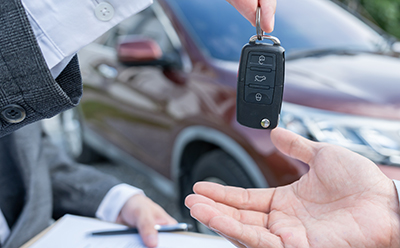Should I Buy a New Car or a Used Car?
Among the many questions a prospective car buyer has to consider, there’s one that often presents itself right from the start. Should I buy a new car or used car?

According to U.S. News and World Report, the best way to answer this is to evaluate your wants, needs, budget, and appetite for risk.
Risk? Yes, buying a car — whether it’s new or used — is an investment. Most investments come with risks to your finances.
Let’s go through a few categories related to car buying to see details you should know before you plunk down some serious cash for your next vehicle.
Manufacturer warranty
A new car comes with a factory warranty. This can eliminate the risk of costly repairs. Be sure you know there is a difference between bumper-to-bumper (literally, parts from bumper to bumper) and powertrain coverage (engine, transmission, drivetrain). A used car can be out of warranty in less than three years after its model year. Perhaps an extended warranty can be transferred, or purchased; otherwise your risk of repairs is higher with the used car.
Maintenance needs
A new car generally comes with less risk in this category. A new car should have no wear and tear, it’s never been in an accident, and you’ll know there’s no issue of a previous owner neglecting oil changes or recalls.
Used cars, particularly those known as “certified preowned,” have come a long way in this category. Preferred Dealers make quality and inspection of “certified preowned” cars a part of their product line.
If you’re not buying off the lot, there are vehicle history reports that can be accessed, often through Carfax. You also can find a mechanic to take a look at the car, if the seller is willing.
Still, newer cars typically come with more design efficiencies, and the odds of mechanical breakdown increase with the number of miles on the odometer. The website DMV.org lists mechanical milestones that used-car buyers should consider.
Depreciation
A new car can lose as much as 20 percent of its value the moment you drive it off the lot. That’s DEPRECIATION! To make up for that, you’re encouraged to make a down payment of at least 20 percent. Otherwise, you become “upside down” on your loan — you owe more than the car’s resale value — and that’s no good in the case of an accident or other loss.
You’re a step ahead with a used car. The previous owner has taken the risk and has absorbed those first few years of accelerated depreciation.
Getting the options important to you
Many snazzy options are becoming standard on new vehicles. More and more improvements have been added to new vehicles in terms of communications (Bluetooth connectivity, for example) and safety (adaptive cruise control, blind-spot monitoring and lane-departure warning). If that’s not enough, plenty of other bells and whistles are readily available at the new car showroom. It’s not hard to find the color or trim you desire.
You’re not exactly stuck with what you buy with a used car. You’ll just have to make a trip to the custom shop if you want to dress up your used car. Since you can shop around and not settle for what the new-car lot is offering, you might come out with a better custom deal.
Purchasing products (extended warranty, etc.)
Extended warranties, getting more coverage once the manufacturer’s agreement has expired, is a common purchase for both new and used cars. Many other protection plans can be applied to both new and used-car models. Credit Insurance can cover your car payments in the case you unexpectedly become ill or injured. Mechanical Repair Coverage can fill in where warranties fall short and cover costly repairs the manufacturer won’t accept. And a GAP (Guaranteed Asset Protection) Plus plan can pay the difference between your vehicle’s actual cash value and what you still owe. That makes it appealing for the new-car buyer.



